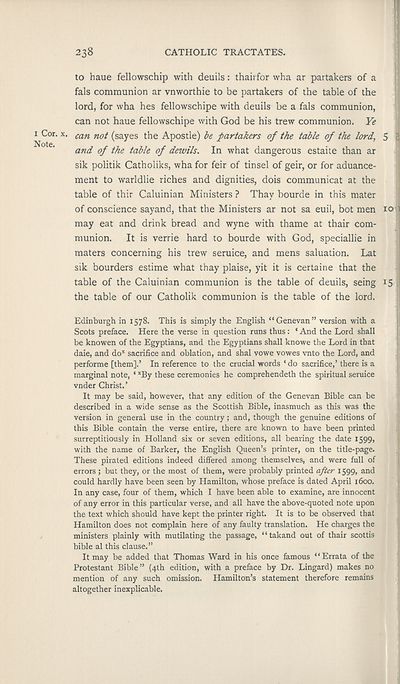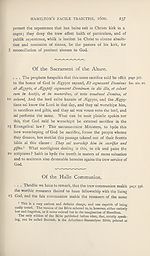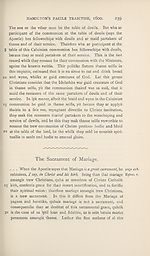Scottish Text Society publications > Old series > Catholic tractates of the sixteenth century, 1573-1600
(323)
Download files
Complete book:
Individual page:
Thumbnail gallery: Grid view | List view

238
CATHOLIC TRACTATES.
I Cor. x
Note.
to haue fellowschip with deuils: thairfor wha ar partakers of a
fals communion ar vnworthie to be partakers of the table of the
lord, for wha hes fellowschipe with deuils be a fals communion,
can not haue fellowschipe with God be his trew communion. Ye
can not (sayes the Apostle) be partakers of the table of the lord,
and of the table of dewils. In what dangerous estaite than ar
sik politik Catholiks, wha for feir of tinsel of geir, or for aduance-
ment to warldlie riches and dignities, dois communicat at the
table of thir Caluinian Ministers ? Thay bourde in this mater
of conscience sayand, that the Ministers ar not sa euil, bot men
may eat and drink bread and wyne with thame at thair com¬
munion. It is verrie hard to bourde with God, speciallie in
maters concerning his trew seruice, and mens saluation. Lat
sik bourders estime what thay plaise, yit it is certaine that the
table of the Caluinian communion is the table of deuils, seing
the table of our Catholik communion is the table of the lord.
Edinburgh in 1578. This is simply the English “Genevan” version with a
Scots preface. Here the verse in question runs thus: ‘And the Lord shall
be knowen of the Egyptians, and the Egyptians shall knowe the Lord in that
daie, and do1 sacrifice and oblation, and shal vowe vowes vnto the Lord, and
performe [them].’ In reference to the crucial words ‘ do sacrifice,’ there is a
marginal note, ‘ xBy these ceremonies he comprehendeth the spiritual seruice
vnder Christ.’
It may be said, however, that any edition of the Genevan Bible can be
described in a wide sense as the Scottish Bible, inasmuch as this was the
version in general use in the country ; and, though the genuine editions of
this Bible contain the verse entire, there are known to have been printed
surreptitiously in Holland six or seven editions, all bearing the date 1599,
with the name of Barker, the English Queen’s printer, on the title-page.
These pirated editions indeed differed among themselves, and were full of
errors ; but they, or the most of them, were probably printed after 1599, and
could hardly have been seen by Hamilton, whose preface is dated April 1600.
In any case, four of them, which I have been able to examine, are innocent
of any error in this particular verse, and all have the above-quoted note upon
the text which should have kept the printer right. It is to be observed that
Hamilton does not complain here of any faulty translation. He charges the
ministers plainly with mutilating the passage, “takand out of thair scottis
bible al this clause.”
It may be added that Thomas Ward in his once famous “Errata of the
Protestant Bible” (4th edition, with a preface by Dr. Lingard) makes no
mention of any such omission. Hamilton’s statement therefore remains
altogether inexplicable.
CATHOLIC TRACTATES.
I Cor. x
Note.
to haue fellowschip with deuils: thairfor wha ar partakers of a
fals communion ar vnworthie to be partakers of the table of the
lord, for wha hes fellowschipe with deuils be a fals communion,
can not haue fellowschipe with God be his trew communion. Ye
can not (sayes the Apostle) be partakers of the table of the lord,
and of the table of dewils. In what dangerous estaite than ar
sik politik Catholiks, wha for feir of tinsel of geir, or for aduance-
ment to warldlie riches and dignities, dois communicat at the
table of thir Caluinian Ministers ? Thay bourde in this mater
of conscience sayand, that the Ministers ar not sa euil, bot men
may eat and drink bread and wyne with thame at thair com¬
munion. It is verrie hard to bourde with God, speciallie in
maters concerning his trew seruice, and mens saluation. Lat
sik bourders estime what thay plaise, yit it is certaine that the
table of the Caluinian communion is the table of deuils, seing
the table of our Catholik communion is the table of the lord.
Edinburgh in 1578. This is simply the English “Genevan” version with a
Scots preface. Here the verse in question runs thus: ‘And the Lord shall
be knowen of the Egyptians, and the Egyptians shall knowe the Lord in that
daie, and do1 sacrifice and oblation, and shal vowe vowes vnto the Lord, and
performe [them].’ In reference to the crucial words ‘ do sacrifice,’ there is a
marginal note, ‘ xBy these ceremonies he comprehendeth the spiritual seruice
vnder Christ.’
It may be said, however, that any edition of the Genevan Bible can be
described in a wide sense as the Scottish Bible, inasmuch as this was the
version in general use in the country ; and, though the genuine editions of
this Bible contain the verse entire, there are known to have been printed
surreptitiously in Holland six or seven editions, all bearing the date 1599,
with the name of Barker, the English Queen’s printer, on the title-page.
These pirated editions indeed differed among themselves, and were full of
errors ; but they, or the most of them, were probably printed after 1599, and
could hardly have been seen by Hamilton, whose preface is dated April 1600.
In any case, four of them, which I have been able to examine, are innocent
of any error in this particular verse, and all have the above-quoted note upon
the text which should have kept the printer right. It is to be observed that
Hamilton does not complain here of any faulty translation. He charges the
ministers plainly with mutilating the passage, “takand out of thair scottis
bible al this clause.”
It may be added that Thomas Ward in his once famous “Errata of the
Protestant Bible” (4th edition, with a preface by Dr. Lingard) makes no
mention of any such omission. Hamilton’s statement therefore remains
altogether inexplicable.
Set display mode to: Large image | Zoom image | Transcription
Images and transcriptions on this page, including medium image downloads, may be used under the Creative Commons Attribution 4.0 International Licence unless otherwise stated. ![]()
| Publications by Scottish clubs > Scottish Text Society publications > Old series > Catholic tractates of the sixteenth century, 1573-1600 > (323) |
|---|
| Permanent URL | https://digital.nls.uk/107667172 |
|---|
| Description | A collection of over 100 Scottish texts dating from around 1400 to 1700. Most titles are in Scots, and include editions of poetry, drama, and prose by major Scottish writers such as John Barbour, William Dunbar, Gavin Douglas, and George Buchanan. Edited by a key scholarly publisher of Scotland's literary history, and published from the late 19th century onwards by the Scottish Text Society. Available here are STS series 1-3. |
|---|

